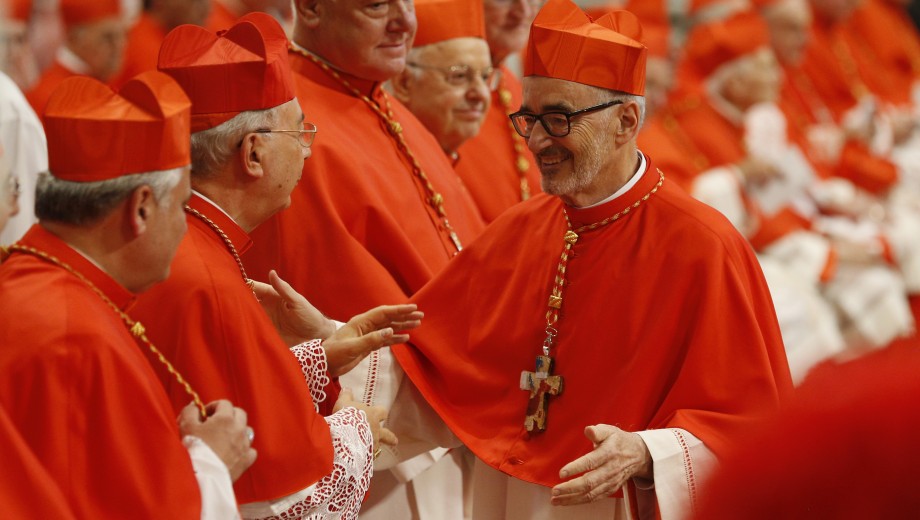Jesuit priest Michael Czerny, PhD’78, was at a landless workers’ center on the outskirts of São Paulo when he learned that he would be made a cardinal. His service in South America dates to his cofounding of the Toronto-based Jesuit Centre for Social Faith and Justice—later relaunched as the Jesuit Forum—in 1979 when he was fresh out of an interdisciplinary humanities doctoral program at the University of Chicago.
Pope Francis officially elevated Czerny to his new role on October 5, 2019. Today, donning a cardinal’s distinctive crimson garments and large pectoral cross, Czerny is among those responsible for electing the next pope.
Czerny’s choice of cross says much about him: fashioned out of the remains of a migrant boat, it represents his work as undersecretary of the church’s Migrants and Refugees Section, a position he has held since 2017. It also symbolizes his family history. After surviving the Nazi occupation of Czechoslovakia—his mother was imprisoned in a concentration camp for having Jewish grandparents—his parents fled to Canada by ship with Michael, then a toddler, and his newborn brother in 1948 as Soviet influence grew.
Since his ordination in 1973, Czerny has worked steadily on issues of social justice, focusing on the most vulnerable populations. In addition to his work with the Jesuit Centre and with migrants, he served as founding director of the African Jesuit AIDS Network from 2002 to 2010. Probably his most recognized humanitarian intervention, however, came in response to a much-publicized crisis in Central America.
In 1990 Czerny came to El Salvador’s University of Central America to help lead the Jesuit school’s administration in the wake of the brutal murders of six priests—including social psychologist Ignacio Martín-Baró, AM’77, PhD’79—along with their housekeeper and her daughter, by a government battalion in 1989 during the country’s protracted civil war. Since the Jesuits had encouraged dialogue between the military junta government and leftist guerrillas, they were viewed as potential subversives.
For two years Czerny served as the university’s vice rector and director of its Institute for Human Rights. “Both an effect and cause of the war was the violation of human rights,” he says. His role was to provide a “reliable public way of knowing what was going on.” Czerny returned to El Salvador in November 2019 to commemorate the 30th anniversary of the slayings.
His lifelong humanitarian work has roots in his studies at UChicago. His dissertation, a study in Marxist-Christian dialogue, attempted to think across geopolitical divides at a time when many more people worldwide were living under explicitly Marxist rule. He earned his PhD in the Committee on the Analysis of Ideas and Study of Methods, which, though now disbanded, had an interdisciplinary mission that is still close to the heart of the Division of the Humanities today. This experience “ended up giving me a kind of flexibility and ability to think on my feet in different contexts that has proven indispensable,” he says.
“They cared about us,” Czerny says, referring to the program’s founder, Richard McKeon—whose work with UNESCO helped inspire the United Nations’ Universal Declaration of Human Rights—and to other faculty in the Division of the Humanities and the Divinity School, which he described as a second home. “And they also cared passionately about their fields of inquiry and communicated that passion.”
There is no shortage of work to which Czerny can turn his own passion and critical acumen as a cardinal. Here he cites the climate crisis, referencing Pope Francis’s call to address global poverty and environmental devastation simultaneously. That these two moral struggles are deeply intertwined is, Czerny says, “a basic Christian truth and a basic human truth, which world leadership is having a hard time getting into focus—what Pope Francis calls caring for our common home.”

